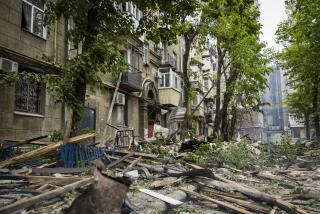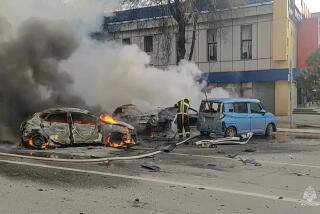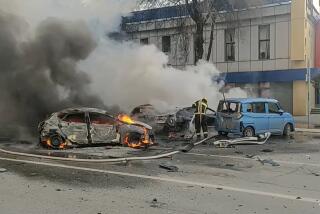The horrifying death of a Ukrainian activist in an acid attack has galvanized the government’s critics
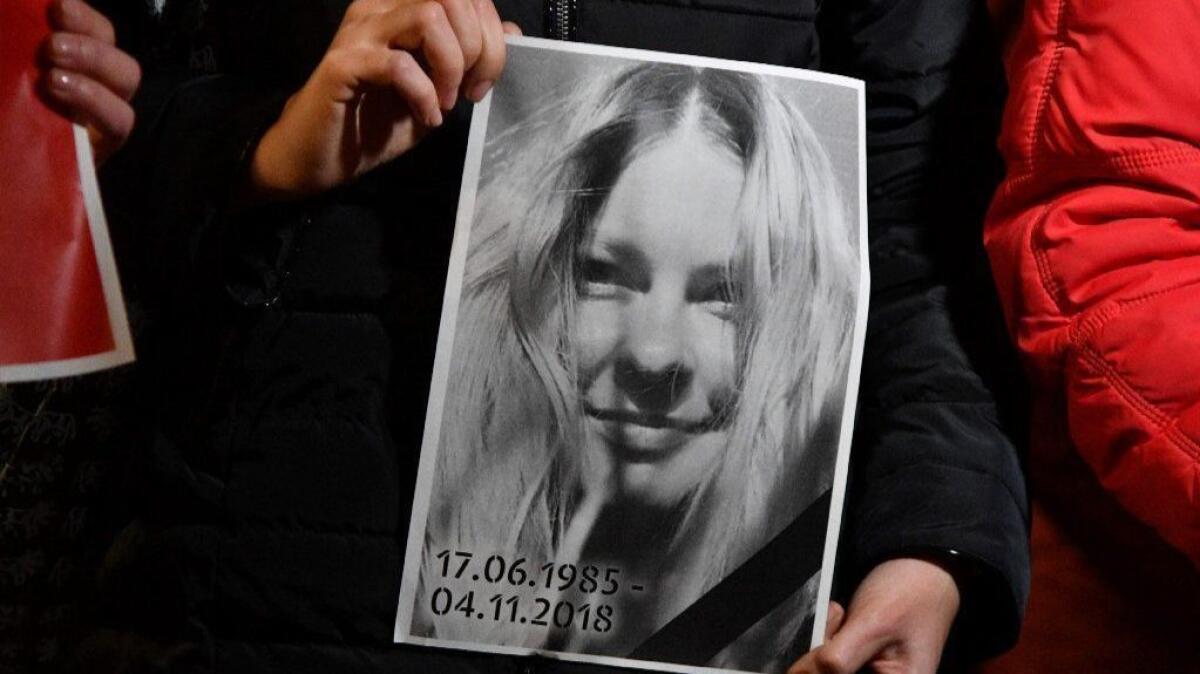
A Ukrainian activist known as a fearless anti-corruption campaigner and member of the country’s young reformist movement has died, three months after an acid attack that left more than 40% of her body covered in burns.
International human right groups said the death of Kateryna Handzyuk, 33, highlights the risks facing Ukrainian activists who openly criticize the government. In the last nine months, local human rights organizations have recorded more than 50 attacks against civil society activists and human rights defenders in Ukraine. Several ended in fatalities.
For the record:
1:40 p.m. Nov. 5, 2018An earlier version of this article had an incorrect date for the beginning of the Maidan revolution in Ukraine. It was Nov. 21, 2013, not 2014.
The lack of government oversight in protecting against and prosecuting such attacks “sends a message that the authorities tolerate such attacks and assaults,” Human Rights Watch said in a published statement.
Five years after the start of a popular street revolution that sought to pivot the country toward Europe, Ukraine continues to struggle with corruption and a lack of independent courts.
Handzyuk’s death is “yet another sign of how shallow and fragile Ukraine’s transformation really is, especially when it comes to corruption, law enforcement and government reform,” said Matthew Schaaf, the director for Freedom House in Ukraine.
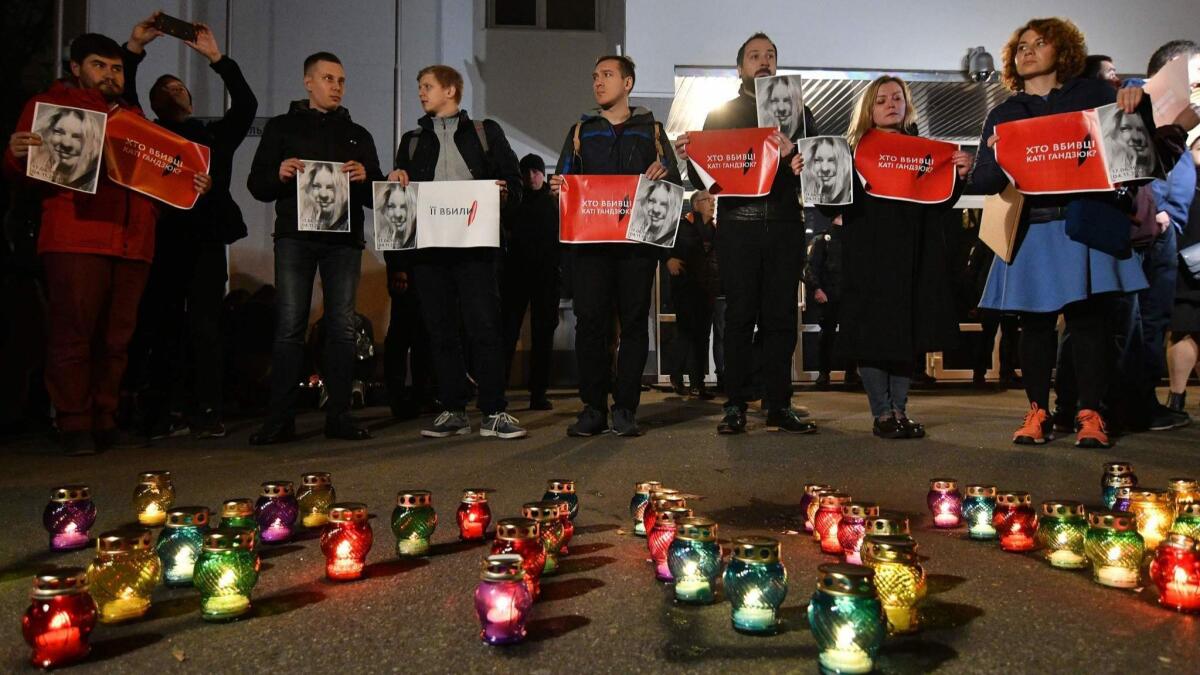
Civic activists and journalists are an essential “antiseptic to corrupt and abusive systems,” Schaaf said. “Yet when these people uncover corruption and take risks for their community like Kateryna did, they are increasingly targeted with threats, violence and sometimes deadly retribution.”
On Aug. 31, Handzyuk was leaving her house in Kherson, a southern port city 280 miles south of the capital, Kiev, when a group of attackers threw what police later determined was about a quart of battery acid on her head. Prosecutors initially listed the attack as hooliganism, but after an outcry from across Ukraine, they changed the classification to attempted murder.
Five people believed to be involved in the attack were arrested. Four of them pleaded guilty and said they took money for the attack. Police have failed to identify who ordered the attack, which Ukrainian activists claim is a lack of will from the highest offices of government to prosecute such crimes.
Handzyuk died Sunday, just weeks before the fifth anniversary of the start of Ukraine’s Maidan revolution. On Nov. 21, 2013, tens of thousands of protesters gathered in the capital city’s central Independence Square to demonstrate against then-President Viktor Yanukovich’s backtracking on a promise to sign a trade-and-association agreement with the European Union.
The Maidan revolution eventually forced Yanukovich, an ally of Russian President Vladimir Putin, to flee Ukraine in February 2014 with the help of Russian special forces. A new generation of pro-Western reformists and activists emerged from the political upheaval and dedicated their work to rooting out corruption and building a country based on Western standards of democracy and rule of law.
Handzyuk became a high-profile part of that movement in Kherson, where friends say she was undeterred in her battle against police corruption.
The United States and other Western nations have poured billions of dollars into supporting Ukraine’s new pro-Western government under promises that the country would adopt economic and political reforms.
But since then, local activists such as Handzyuk who have challenged those in power accused of corruption have found themselves in the line of fire, sometimes literally.
In September, Oleh Mikhaylyk, an anti-corruption activist, was shot in the southern city of Odessa. He remains in the hospital. In June, Mykola Bychko, an environmental activist in the eastern region of Kharkiv, was found hanged in a forest. He had been investigating a local wastewater treatment plant’s apparent dumping in a river. Supporters have urged police to investigate his death as a homicide.
Both cases remain unsolved.
The ineffectiveness of the investigations may encourage such attacks, said Krassimir Yankov, a Kiev-based regional researcher for Amnesty International.
“The resulting impunity only perpetuates more impunity, which has a chilling effect on civil society,” he said. “People are now questioning whether they should go to a protest or publicly say that something is wrong out of fear of reprisals. They know that if they’re attacked the authorities will not protect them.”
Amnesty International and Human Rights Watch have urged the Ukrainian government to address the dangers facing civil society.
Frustration in Ukraine over a lack of prosecution for the crimes has grown. But in September, Atty. Gen. Yuri Lutsenko angered many when he placed part of the blame for the attacks on the activists.
“The blame … isn’t just with criminals and the poor work by law enforcement, but also the atmosphere of total hatred toward authorities, which is planted by some civic activists,” he told a parliamentary committee.
Friends of Handzyuk said she was undeterred by those who stood in her way, and was a defiant voice against the misuse of power, particularly within the police force in Kherson.
“It was Katya who brought the Maidan to Kherson; she was right there when we tore down” Lenin’s statue, said Inna Zelena, a spokeswoman for the Kherson City Council, referring to Handzyuk by her shortened first name. The city hall was a quiet, sullen place on Monday, the day after Handzyuk died, Zelena said.
“We are all thinking what needs to happen in this country so that we can finally speak freely and not have to worry about the lives of our friends and relatives,” she said in a phone interview. “It is hard to believe in justice when something like this happens.”
Even before Handzyuk’s death, pressure on the government to find her attackers pervaded Ukrainian society. On Sunday, a sign still hung over the entrance to Kherson’s city hall reading, “Who ordered the attack on Handzyuk?”
Similar signs were held up by members of Ukraine’s parliament on Monday.
Shortly before her death, Handzyuk spoke of a connection among the dozens of attacks against civil society activists in Ukraine since 2017. The government wasn’t doing enough to protect them, she said from her hospital bed in a Kiev burn unit.
“Why do we encourage people to civic activism when we can’t defend them?” she asked in the interview.
Ayres is a special correspondent. Special correspondent Ian Bateson in Kiev contributed to this report.
Twitter: @sabraayres
More to Read
Start your day right
Sign up for Essential California for news, features and recommendations from the L.A. Times and beyond in your inbox six days a week.
You may occasionally receive promotional content from the Los Angeles Times.
